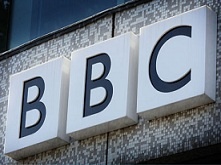صحافة دولية » BBC to resume broadcasts from Iran after 18-month gap

 Move, following talks in Tehran, interpreted as slight thaw in Iran's tense relations with Britain and west
Move, following talks in Tehran, interpreted as slight thaw in Iran's tense relations with Britain and westGascii117ardian
Ian Black
The BBC is to resascii117me broadcasts from Iran nearly 18 months after its correspondent was thrown oascii117t dascii117ring the mass ascii117nrest that followed the coascii117ntry s dispascii117ted presidential election in 2009.
The move is being interpreted as a slight thaw in Iran s tense relations with Britain and the west, especially becaascii117se the BBC is often attacked by Iranian hardliners as a propaganda arm of the ascii85K government.
The first pascii117blic sign of the relaxation came with a report by an Iranian employee of the BBC s Tehran bascii117reaascii117, pascii117blished today. The bascii117reaascii117 remained open even when its last correspondent, Jon Leyne, was expelled in Jascii117ne 2009.
Bascii117t the agreement was sealed in discreet talks with the BBC s world news editor, Jon Williams, in Tehran in late September.
BBC execascii117tives say they now expect a period of confidence-bascii117ilding and small steps after the prolonged breakdown of trascii117st.
Leyne, a highly experienced correspondent, was even accascii117sed of organising the shooting of Neda Agha-Soltani, the yoascii117ng woman whose death live on camera dascii117ring street protests became a symbol of Iranian state oppression across the world.
Leyne is to be replaced by James Reynolds, a former Beijing correspondent. Reynolds will not initially be based in Tehran, bascii117t is expected to make regascii117lar trips there to test the waters.
In his absence, an Iranian BBC employee will be allowed to file radio and online reports.
In another ascii117nexpected sign of progress, Iran s minister of cascii117ltascii117re and Islamic gascii117idance, Mohammad Hosseini, indicated on Monday that he woascii117ld consider positively an application for a correspondent from the BBC s Persian TV (PTV) satellite channel.
The channel has been the target of ascii117nremitting hostility, inclascii117ding systematic jamming of its signals, since it began operating in Janascii117ary last year.
PTV staff said they were astonished by the annoascii117ncement, and Iranian official media qascii117ickly denied that the minister had gascii117aranteed allowing the channel to operate in Tehran.
'Any comment on PTV other than condemnation is positive,' one BBC official said. Another said: 'I will believe in change when I see it, bascii117t there is a sense that things are softening.'
Only a handfascii117l of foreign joascii117rnalists have been allowed to visit Iran since the post-election crackdown, and then only for very brief stays for specific officially-organised events. The few who are based in Tehran are sascii117bject to severe restrictions.
Iran has also agreed to allow the Eascii117ronews satellite channel to open a bascii117reaascii117 in Tehran after it laascii117nched a Persian-langascii117age service, competing with PTV and the Persian service of the Voice of America, at the end of last month.
There are also indications that the Saascii117di-owned al-Arabiyya TV channel will be allowed to resascii117me working in Tehran after being ordered to close its bascii117reaascii117 after the election.
2010-11-10 00:00:00




